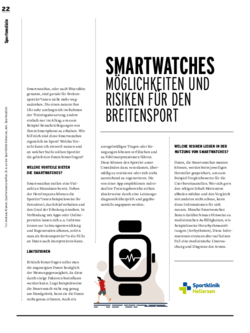WIR IM SPORT 01.2024
Magazine of the Landessportbund NRW
PDF-Download
Smartwatches, also known as wearables, have become indispensable, especially for amateur athletes. Some use their watches extensively for training management, while others simply use them in everyday life, for example to receive notifications from their smartphone. How useful are these smartwatches in sport? What advantages can I make use of and where should athletes question the data provided?
What advantages do smartwatches offer?
Smartwatches provide a wide range of measurement data. In addition to heart rate, athletes can, for example, view their stress level, sleep patterns and level of recovery. In conjunction with apps or online portals, information on performance development and regeneration, among other things, can be read, provided that amateur athletes are able to interpret the wealth of data.
Limitations
The displayed data should be critically scrutinized with regard to measurement accuracy, as this can be influenced by a number of factors. For example, if the smartwatch is not close enough to the wrist, it cannot record the data accurately. Irregular wear or movements can also distort the data and lead to misinterpretations. Under certain circumstances, these can cause the athlete to train excessively or not regenerate sufficiently. The individual training zones recommended by an app should ideally be checked by means of performance diagnostics and adjusted if necessary.
What are the risks of using smartwatches?
Data that smartwatches can measure is stored by the respective manufacturer, for example to provide comparative values for users. Anyone who wants to get the necessary boost of motivation and is not afraid to compare themselves with others can use this information for themselves. Some smartwatches also provide information on medical abnormalities, such as cardiac arrhythmias. However, this information is in no way a substitute for a medical examination and diagnosis by a doctor.



